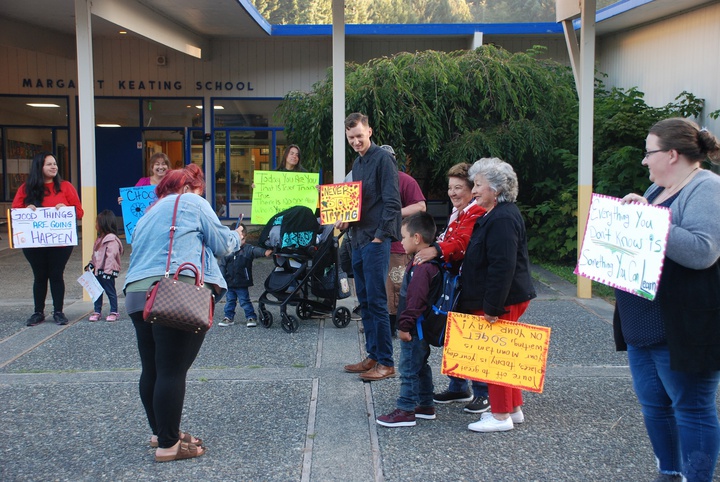Jessica Cejnar / Tuesday, March 3, 2020 @ 2:29 p.m. / Education
DNUSD To Focus On Services, Resources For Special Ed Students During LCAP Process; Community Meetings Set

Parents, grandparents and staff at Margaret Keating Elementary School welcome students to their first day in August. File photo: Jessica Cejnar
School district officials say they will be “drilling down” to make every resource and service available to help special education students improve in the next three years.
Special education students have performed lower than others in English-language arts, math and chronic absenteeism, Tom Kissinger, Del Norte Unified School District assistant superintendent of curriculum and instruction, told the school board Thursday.
As DNUSD continues to develop a state-required plan for how it will spend extra dollars it receives for special education, English language learners, foster and homeless youth, Kissinger said all schools are performing below the state average in English-language arts and math. But special education students are performing below all other student groups in those areas.
“What we’re going to be doing is drilling down and, as our superintendent says, to the sub atomic level, look at every aspect, every resource, every service, every person who serves and (will be) working with parents and staff to see what we can do to make improvements to those areas,” Kissinger told the school board.
“Our English language learners are performing lower than all other groups and, one of the statistics that we talked about in our foster youth advisory council, our foster youth are being suspended at a much higher rate — 25 percent. That’s something we need to work on.”
Kissinger updated the board on the district’s process for the Local Control Accountability Plan, or LCAP, a 3-year plan that describes the services, programs and resources the district has to support English language learners, low-income students, foster students and homeless youth. Those student populations make up about 55 percent, or nearly 2,500, of the district’s 3,700 students, Kissinger said.
According to Kissinger, DNUSD will receive $6 million in state dollars to serve English language learners, low-income students, foster students and homeless youth. This is in addition to the district’s overall base grant of about $28.3 million.
DNUSD may receive a bit more in 2020-2021, but Kissinger said it won’t be significant.
As DNUSD enters March, officials are seeking input from the public on student needs for the 2020-2023 LCAP. DNUSD will also share revised plan goals and will discuss how its funds will be spent on services.
Outreach includes surveying and holding focus groups at the high school level throughout March; meeting with principals, the Foster Youth Advisory Committee and the American Indian Advisory Committee. Community meetings will also be held at Smith River School on March 18; in Crescent City on March 23; and in Klamath on March 24.
A community meeting focusing on the LCAP will also be held at the Hmong Cultural Center this month, though the date has yet to be determined. A general community meeting will focus on the LCAP’s expenditure plan next month.
The Board of Trustees will discuss LCAP proposals in May and will hold a public hearing in June before approving the final LCAP.
In DNUSD, 67 percent of its students are low-income and 7 percent are English language learners, Kissinger said. There are 79 foster youth and 244 homeless student in the district and in the Del Norte County Office of Education, he said.
According to Kissinger, as the district works to reach the LCAP’s four goals — increasing student achievement, boosting student attendance, creating a culture of collaboration and maintaining safe, clean and welcoming schools — they’ll reach out to several stakeholder groups to determine what’s working well and what needs improvement.
Those stakeholder groups, which includes parents, will also be asked to propose new programs or eliminate existing ones, Kissinger said.
“Ultimately when we work with stakeholder groups, it comes down to asking these four questions,” he said. “What’s working well? What doesn’t seem to be working so well? Are there any new programs or services we might want to consider or things we might want to consider eliminating? Through dialogue, discussion and a back-and-forth, we hope to make strong recommendations as we go further in the process in the spring.”
For more information about the DNUSD’s Local Control Accountability Plan, click here.
CLICK TO MANAGE